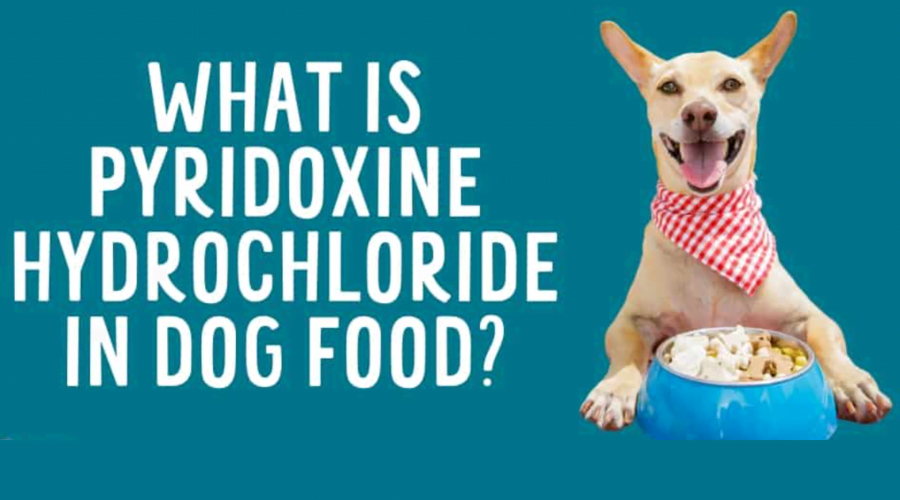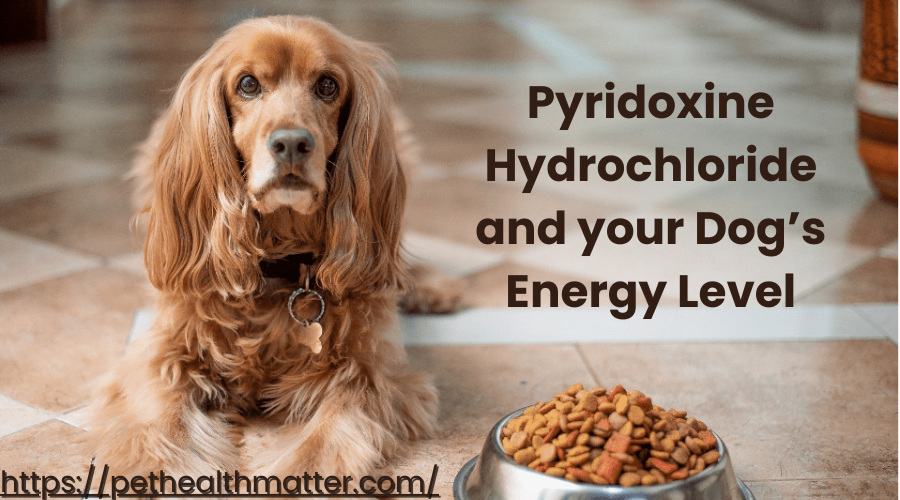Introduction to Pyridoxine Hydrochloride in Dog Food

Proper nutrition is essential for the overall health and well-being of dogs. Like humans, dogs require a balanced diet. Children need an adequate intake of nutrients to facilitate their growth, development, and overall well-being. One essential nutrient that plays a crucial role in dog nutrition is pyridoxine hydrochloride. Pyridoxine hydrochloride, or vitamin B6, is a necessary nutrient in many dog foods. Dog owners must understand the role of pyridoxine hydrochloride in their pet’s diet and how it can benefit their dog’s health.
What is Pyridoxine Hydrochloride?
Pyridoxine hydrochloride is a water-soluble vitamin that belongs to the B-vitamin family. It is an essential nutrient that is vital in various bodily functions. Pyridoxine hydrochloride is involved in metabolizing proteins, carbohydrates, and fats. This function is also responsible for creating neurotransmitters in the brain. Dog owners must ensure that their pet’s diet contains enough pyridoxine hydrochloride to support their dog’s overall health.
Sources of pyridoxine hydrochloride in dog food can include meat, fish, poultry, whole grains, and vegetables. Many commercial dog foods are fortified with pyridoxine hydrochloride to ensure that dogs receive an adequate amount of this essential nutrient. Dog owners need to read the labels of dog food products to ensure they contain pyridoxine hydrochloride or other sources of vitamin B6.
The Importance of Pyridoxine Hydrochloride in Dog Nutrition
Pyridoxine hydrochloride plays a crucial role in dog nutrition. It is involved in various metabolic processes in the body and is necessary for the proper functioning of enzymes. Pyridoxine hydrochloride is essential for the metabolism of proteins, the body’s fundamental building blocks. It helps synthesize amino acids, which are the building blocks of proteins. Without adequate pyridoxine hydrochloride, dogs may experience a deficiency in protein metabolism, which can lead to various health issues.
Pyridoxine hydrochloride also plays a role in carbohydrate metabolism. Carbohydrates are broken down into glucose by this substance, the body’s primary energy source. Without enough pyridoxine hydrochloride, dogs may experience decreased energy levels and become lethargic or sleepy.
Additionally, pyridoxine hydrochloride is involved in the metabolism of fats. It helps break down fats into fatty acids essential for various bodily functions. Without enough pyridoxine hydrochloride, dogs may experience a decrease in fat metabolism, leading to weight gain and other health issues.
How Pyridoxine Hydrochloride Affects Your Dog’s Health
Pyridoxine hydrochloride affects a dog’s health in various ways. One of the critical benefits of pyridoxine hydrochloride is its role in supporting a dog’s immune system. The immune system is responsible for protecting the body against infections and diseases. Pyridoxine hydrochloride helps produce antibodies, which are proteins that help fight off harmful bacteria and viruses. Without enough pyridoxine hydrochloride, dogs may have a weakened immune system and be more susceptible to infections and diseases.
Another vital way pyridoxine hydrochloride affects a dog’s health is its role in supporting digestive health. Pyridoxine hydrochloride helps produce digestive enzymes necessary for the breakdown and absorption of nutrients from food. Without enough pyridoxine hydrochloride, dogs may experience digestive issues such as diarrhea, constipation, or poor nutrient absorption.
Pyridoxine hydrochloride also plays a role in maintaining healthy skin and coat in dogs. This protein boosts collagen production for skin health. It also helps in the production of sebum, which is a natural oil that helps to keep the skin and coat moisturized. Without enough pyridoxine hydrochloride, dogs may experience dry, itchy skin and a dull, brittle coat.
The Role of Pyridoxine Hydrochloride in Your Dog’s Immune System
Pyridoxine hydrochloride plays a crucial role in supporting a dog’s immune system. The immune system is responsible for protecting the body against infections and diseases. Pyridoxine hydrochloride helps produce antibodies, which are proteins that help fight off harmful bacteria and viruses.
A robust immune system is essential for dogs to stay healthy and fight off infections. Without enough pyridoxine hydrochloride, dogs may have a weakened immune system and be more susceptible to infections and diseases. Dog owners must ensure that their pet’s diet contains enough pyridoxine hydrochloride to support their immune system.
Pyridoxine Hydrochloride and Your Dog’s Digestive Health
Pyridoxine hydrochloride plays a crucial role in supporting a dog’s digestive health. It helps produce digestive enzymes necessary for the breakdown and absorption of nutrients from food.
Digestive enzymes break down proteins, carbohydrates, and fats into smaller molecules the body can absorb. Without enough pyridoxine hydrochloride, dogs may experience digestive issues such as diarrhea, constipation, or poor nutrient absorption.
Dog owners must ensure that their pet’s diet contains enough pyridoxine hydrochloride to support their dog’s digestive health. This can be achieved by feeding them a balanced diet that includes sources of pyridoxine hydrochloride such as meat, fish, poultry, whole grains, and vegetables.
Pyridoxine Hydrochloride and Your Dog’s Skin and Coat Health
Pyridoxine hydrochloride is crucial in maintaining healthy skin and coat in dogs. It helps in the production of collagen, which is a protein that is essential for the health and elasticity of the skin. It also helps in the production of sebum, which is a natural oil that helps to keep the skin and coat moisturized.
Without enough pyridoxine hydrochloride, dogs may experience dry, itchy skin and a dull, brittle coat. They may also be more prone to skin infections and allergies.
Dog owners must ensure that their pet’s diet contains enough pyridoxine hydrochloride to support their dog’s skin and coat health. This can be achieved by feeding them a balanced diet that includes sources of pyridoxine hydrochloride such as meat, fish, poultry, whole grains, and vegetables.
Pyridoxine Hydrochloride and Your Dog’s Brain Function
Pyridoxine hydrochloride plays a crucial role in supporting a dog’s brain function. It synthesizes neurotransmitters in the brain, which are chemicals that transmit signals between nerve cells.
Neurotransmitters are essential for various brain functions such as memory, learning, mood regulation, and behavior. Without enough pyridoxine hydrochloride, dogs may experience cognitive issues such as memory loss, difficulty learning new tasks, and changes in behavior.
Dog owners need to ensure that their pet’s diet contains enough pyridoxine hydrochloride to support their dog’s brain function. This can be achieved by feeding them a balanced diet that includes sources of pyridoxine hydrochloride such as meat, fish, poultry, whole grains, and vegetables.

Pyridoxine Hydrochloride and Your Dog’s Energy Levels
Pyridoxine hydrochloride plays a crucial role in supporting a dog’s energy levels. It is involved in the metabolism of carbohydrates, which are the body’s primary energy source.
Carbohydrates are broken down into glucose, which the body uses as fuel. Without enough pyridoxine hydrochloride, dogs may experience decreased energy levels and become lethargic or sleepy.
Dog owners must ensure that their pet’s diet contains enough pyridoxine hydrochloride to support their dog’s energy levels. This can be achieved by feeding them a balanced diet that includes sources of pyridoxine hydrochloride such as meat, fish, poultry, whole grains, and vegetables.
How to Ensure Your Dog is Getting Enough Pyridoxine Hydrochloride
If you want to ensure that your dog receives adequate pyridoxine hydrochloride in its diet, you should take some measures. Feeding them a balanced diet that includes sources of this essential nutrient is important. Commercial dog foods often contain added pyridoxine hydrochloride to ensure that dogs receive an adequate amount.
When selecting dog food, it’s crucial to carefully examine labels and search for natural ingredients like meat, fish, whole grains, and vegetables containing pyridoxine hydrochloride. Choosing a high-quality dog food formulated to meet dogs’ nutritional needs is also essential.
In addition to feeding your dog a balanced diet, you can also consider adding supplements containing pyridoxine hydrochloride. However, it is essential to consult your veterinarian before adding accessories. Add only safe and appropriate foods to your dog’s diet. Always double-check the ingredients before feeding them to your pet.
Potential Risks of Pyridoxine Hydrochloride Overdose in Dogs
While pyridoxine hydrochloride is an essential nutrient for dogs, it is crucial to be aware of the potential overdose risks. Excessive intake of pyridoxine hydrochloride can lead to toxicity and cause various health issues.
Symptoms of pyridoxine hydrochloride overdose in dogs may include neurological issues such as seizures, tremors, and difficulty walking. It can also cause gastrointestinal problems such as nausea, vomiting, and diarrhea.
To avoid pyridoxine hydrochloride overdose in dogs, following the recommended dosage guidelines provided by the dog food manufacturer or supplement is essential. It is also necessary to consult with your veterinarian before adding any accessories to your dog’s diet to ensure they are safe and appropriate for your pet.
Conclusion: The Importance of Pyridoxine Hydrochloride in Your Dog’s Diet
In conclusion, pyridoxine hydrochloride is a critical nutrient that plays a crucial role in dog nutrition. It is involved in various metabolic processes in the body and is necessary for the proper functioning of enzymes. Pyridoxine hydrochloride supports a dog’s immune system, digestive health, skin and coat health, brain function, and energy levels.
To ensure that your dog gets enough pyridoxine hydrochloride in their diet, feeding them a balanced diet that includes sources of this essential nutrient is important. Commercial dog foods often contain added pyridoxine hydrochloride. Still, it is necessary to read the labels and choose a high-quality dog food formulated to meet the nutritional needs of dogs.
It is also essential to consult with your veterinarian to ensure your dog’s diet is appropriate for their needs. By providing your dog with a balanced diet that includes sources of pyridoxine hydrochloride, you can help support their overall health and well-being.
FAQs
-
What is Pyridoxine Hydrochloride in Dog Food, and Why is it Important?
Pyridoxine hydrochloride, also known as Vitamin B6, plays a crucial role in a dog’s health. It aids in various bodily functions, such as metabolism, nerve function, and more. Learn how its presence in dog food benefits your furry friend.
-
How Much Pyridoxine Hydrochloride Should Be in My Dog’s Food?
Discover the recommended daily intake of Pyridoxine Hydrochloride for dogs and how to ensure your pet gets the right amount through their diet. We’ll also explain the consequences of deficiencies or excess intake.
-
Which Dog Breeds or Life Stages Benefit Most from Pyridoxine Hydrochloride in Food?
Different dog breeds and life stages may have varying nutritional needs. Explore which breeds or life stages benefit most from the inclusion of Pyridoxine Hydrochloride in their food, and why tailoring their diet is essential.
-
Are There Any Side Effects or Risks Associated with Pyridoxine Hydrochloride in Dog Food?
It’s essential to be aware of potential side effects or risks when incorporating Pyridoxine Hydrochloride into your dog’s diet. Learn about common concerns, such as allergies or toxicity, and how to mitigate them.
-
What Are Some High-Quality Dog Food Brands that Include Pyridoxine Hydrochloride?
Finding the right dog food can be challenging with so many options on the market. Get recommendations for reputable dog food brands that incorporate Pyridoxine Hydrochloride and prioritize your dog’s overall well-being.
To read more about Dog healthy food then click on the link Showtime Dog Food Review
